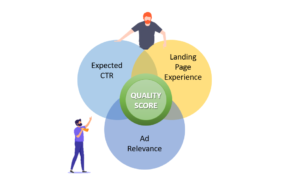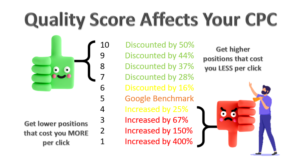How Quality Score Works

Ever Wanted to Know How Quality Score Works?
If you’re wondering how Quality Score works, you’re already on track to success! It’s essential to understand how Quality Score (also known as QS) works to ensure you get the most out of your ads. So, let’s get down to the nitty-gritty.
You might also want to look at these resources on Quality Score:
- 10 Ways to Improve Your Google Ads Quality Score
- How to Improve Ad Relevance Score
- How Quality Score Works
What Does Quality Score Mean?
Google Ads uses “Quality Score” to assess how relevant your ad is to a search term. Essentially, your Quality Score is based on three main factors: expected click-through rate, the quality of your ads and your landing page experience.
When your score is higher, you are likely to achieve better ad positions on Google and spend less money. It’s amazing how effective it can be to understand how Quality Score works.
How Quality Score Works: The Basics
To see your Quality Score, you must have the Quality Score section enabled on your Google Ads report. You will then be able to see how relevant your keywords are.
When you add a keyword to your account and it gains enough traffic to generate data, Google will assign it a score out of 10, with 10 being the best score you can achieve. Let’s aim high!
Google uses its trusty algorithms to monitor how users interact with search results. Algorithms are so efficient (who needs humans anyway?) they can even predict future interactions, including how likely it is that a user will click-through on your ad. Discover more about how click-through rate affects your score here.
How Quality Score Works – Types of Quality Score
It’s useful to know the different types of Quality Score. So let’s take a look at some of the key ways that Quality Score is calculated.
Account-Level Quality Score
One thing to be aware of is that Google has its favourites! And unfortunately, Google favours older accounts. This is because Google judges the performance of keywords and ads over time.
Your quality score will be higher if you have an older account with a solid performance history. For newer accounts, it takes time and patience to improve your score.
Similarly, a campaign with a history of good performance and Quality Score is more likely to continue to receive better scores than a brand new campaign. That doesn’t mean you should stick with a campaign that isn’t working!
Sometimes a rebuild and refresh is needed if a campaign has become unorganised, or if you’re wanting to test something new, but if it’s not broken, don’t just start again from scratch. Run a split test against the original and see if changing the campaign structure actually helps or not.
Keyword-Level Quality Score
Google calculates your Keyword-Level Quality Score based on the performance of search terms that match your keyword. This is why it is essential to choose your keywords wisely.
Your Keyword-Level Quality Score is the number you can see in Google Ads between 1-10. You’ll also be able to see columns that show a breakdown of your quality score by Google’s key metrics: Ad Relevance, Landing Page Experience and Expected Click Through Rate.
Landing Page Experience
The Quality Score of your landing page will be determined based on three key factors: how relevant/original the content is, how transparent it is and how easy it is to navigate. That last one is very important as it includes the page’s mobile friendliness and loading speed.
Relevance between Keyword, Ad and Landing Page is crucial. If your keyword is “Nike shoes” and your ad says “Nike shoes” but your landing page is just your homepage, that’s likely to result in a worse landing page experience than if the landing page was for ‘Nike shoes’.
You don’t need a landing page for every keyword, but it’s important that your ad takes the user to the most relevant page you have for the search they’ve made. Don’t just optimise your home page and send everybody there. If the landing page isn’t what the user searched for, they’re more likely to bounce and find another result than scour through your website for what they were looking for.
A high quality landing page is more likely to convert your visitors into customers, so it is worth spending the time on developing a better landing page experience.
Ad Relevance
Ad Relevance is scored based on how relevant the ad is to what the user searched for. In an ideal world, what the user wants is for what they searched to be in the headline of one of the search results.
If the user searches for “Red Nike Shoes”, and your ad shows with the headline “Red Nike Shoes”, you’ll have a higher Ad Relevance than if it says “Look at our range of shoes”.
This is where grouping keywords together based on relevance is important. If all your keywords are together in one ad group, the same ad is used for all of them, so the Ad Relevance will likely be low. You can’t make a single ad relevant to a hundred different keywords (unless you use DKI – Dynamic Keyword Insertion).
This is why lots of advertisers now use Single Keyword Ad Groups (SKAGs), so they can create specific ads tailored to each keyword so ad relevance is as high as possible.
Discover how to boost your Ad-Level score here.
Expected Click Through Rate
CTR is not just an indication of how effective your ads are at getting searchers to click your ads. CTR also contributes to your Quality Score.
When Google decides which results to show for a search, one of the factors it takes into account is: “How likely is a user to click this result?” This is how Google measures Expected CTR.
So if you’ve run a lot of ads with broader keywords that sometimes show for less relevant terms, or if you consistently have a lower CTR than your competitors, the data is telling Google your ads are less likely to be clicked, and therefore to show your ads less.
This also impacts your account-level and campaign-level quality score. If you have a history of poor CTR, any new keywords you add to your Google Ads account will be marked down, even if they have a better CTR than your account average.
How Quality Score Works
In the above example – if the Google Benchmark winning bid was £1 and your quality score was 10 you might only spend £0.50 on your click, but of your quality score was just one you could be spending £4.00 for the same click. This shows why concentrating your efforts on improving the many parts that go into quality score will have a huge benefit on your results.
I hope you’ve developed a better understanding of how Quality Score works. Please don’t hesitate to get in touch with us here for more guidance on how to grow your business through PPC!
Is Google PPC worth it? Maximising ROI in Google Paid Search for advertisers requires a strategic approach that encompasses targeting, data-driven decision-making, and continuous optimisation. As the leading PPC agency in the UK, we are committed to providing actionable insights and expert guidance to help advertisers achieve exceptional results. With a focus on Google Ads, Google Shopping, YouTube Ads, and more, our comprehensive services aim to elevate PPC campaigns to new heights. Contact us today for a free Google Ads PPC audit and take the first step towards unlocking the full potential of your PPC.
Author
Search Blog
Free PPC Audit
Subscribe to our Newsletter
The Voices of Our Success: Your Words, Our Pride
Don't just take our word for it. With over 100+ five-star reviews, we let our work-and our satisfied clients-speak for us.
"We have been working with PPC Geeks for around 6 months and have found Mark and the team to be very impressive. Having worked with a few companies in this and similar sectors, I rate PPC Geeks as the strongest I have come across. They have taken time to understand our business, our market and competitors and supported us to devise a strategy to generate business. I value the expertise Mark and his team provide and trust them to make the best recommendations for the long-term."
~ Just Go, Alasdair Anderson


